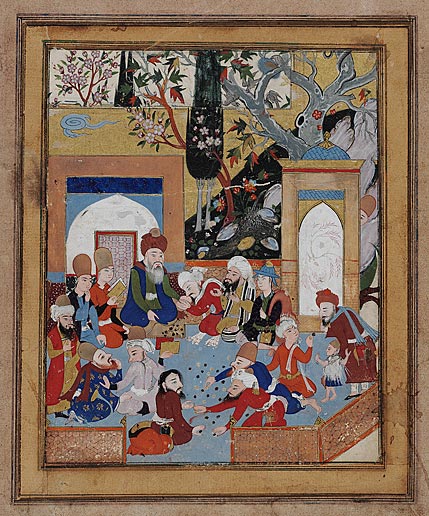
This miniature, now in the collection of Boston's Museum of Fine Arts, may have once been part of Morgan manuscript of Tarjuma-i Thawāqib-i manāqib (A Translation of Stars of the Legend), though no others have rectangular frames. According to Aflākī, who wrote the original Persian text, Rūmī was given a china bowl of sweetmeats by a lady who wished him to pray for and bless her husband, who was on a pilgrimage to Mecca. Rūmī then distributed the sweetmeats to his disciples, yet the bowl miraculously remained full. He then took the bowl to the roof, returning empty-handed, explaining that he had given it to the lady's husband. When the husband returned from Mecca, his wife found the bowl in his luggage. He then said that an arm inexplicably projected itself into his tent and handed him the bowl. After realizing what happened they went to Rūmī, who said that "God had merely made use of his hand as the instrument wherewith to make manifest His power."
Rūmī, Persian Mystic And Poet
The sixteenth-century miniatures presented here concern the life and miracles of Jalāl al-Dīn Rūmī, called Mē vlāna (Our Master), the most famous member of the Mevlevī order and Persia's greatest Sufi mystic and poet. He was born in Balkh in 1207, but his family emigrated after his father foresaw the Mongol conquest. They eventually resettled in Konya, Turkey, then the capital of Anatolian Rūm (thus Rūmī), where the poet died on 17 December 1273.
Several Persian accounts of Rūmī's life have been written, the first by his son, Sultan Walad. The third, laden with moralizing miracle stories, was ordered by Rūmī's grandson Ulu ˓Ārif Chelebi. It was written by the dervish Shams al-Dīn Aḥmad, called Aflākī (d. 1360). Aflākī also incorporated verses from Rūmī's works, notably his six-volume Masnavī (a poetical form of rhyming couplets) and the Dīvān-i-Shams al-Dīn Tabrīzī, named after Shams of Tabriz, the mystic who changed Rūmī's life and transformed him into a poet when they met in 1244.
In 1590—three and a half centuries after Aflākī wrote his life of Rūmī—the Ottoman sultan Mūrad III ordered a Turkish translation of a 1540 abridged version of Aflākī's text entitled Tarjuma-i Thawāqib-i manāqib (Stars of the Legend). The translator was Darvīsh Mahmud Mesnevī Khān of Konya. Two illustrated copies of the Murād translation, both made in Baghdad, survive. One, dated 1599, is held by Topkapi Palace, Istanbul, and has twenty-two miniatures. The other, richer manuscript is held by the Morgan. It dates to the 1590s and includes twenty-nine miniatures. They are all featured here, along with two folios from other collections that are believed to have once been part of the Morgan manuscript.
